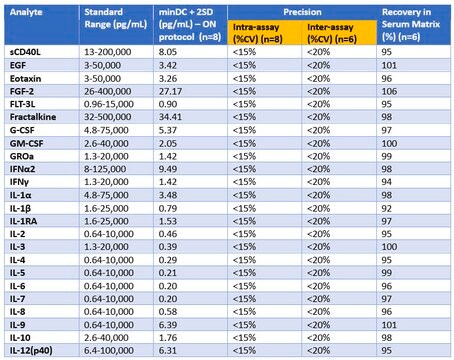HKI1MAG-99K
MILLIPLEX® Human Kidney Injury Magnetic Bead Panel 1 - Toxicity Multiplex Assay
The analytes available for this multiplex kit are: Calbindin, Collagen IV, Fatty Acid Binding Protein 1 (FABP1), GSTα, IP-10, Kidney Injury Molecule-1 (KIM-1), Renin, TFF-3, TIMP-1.
About This Item
Empfohlene Produkte
Qualitätsniveau
Speziesreaktivität
human
Hersteller/Markenname
Milliplex®
assay range
accuracy: 73-117%
sensitivity: 0.010-6.473 ng/mL
(MinDC = 2SD)
standard curve range: 0.005-5 ng/mL
(IP-10)
standard curve range: 0.02-25 ng/mL
(Renin)
standard curve range: 0.05-50 ng/mL
(GSTα)
standard curve range: 0.05-50 ng/mL
(KIM-1)
standard curve range: 0.10-100 ng/mL
(TIMP-1)
standard curve range: 0.20-200 ng/mL
(Calbindin)
standard curve range: 0.34-350 ng/mL
(Collagen IV)
standard curve range: 0.49-500 ng/mL
(TFF-3)
standard curve range: 5.86-6,000 ng/mL
(FABP1)
inter-assay cv: <15%
intra-assay cv: <10%
Methode(n)
multiplexing: suitable
Nachweisverfahren
fluorometric (Luminex xMAP)
Versandbedingung
wet ice
Allgemeine Beschreibung
The MILLIPLEX® portfolio provides valuable research assays to investigate multiple biomarkers of kidney injury in human urine samples using the Luminex® xMAP® instrument platform. The analytes available for this multiplex kit are: Calbindin, Collagen IV, Fatty Acid Binding Protein 1 (FABP1), GSTα, IP-10, Kidney Injury Molecule-1 (KIM-1), Renin, TFF-3, TIMP-1.
Panel Type: Toxicity
Spezifität
There was no or negligible cross-reactivity between the antibodies for an analyte and any of the other analytes within a panel.
Anwendung
- Analytes: Calbindin, Collagen IV, FABP1, GSTα, IP-10, KIM-1, Renin, TFF-3, TIMP-1
- Recommended Sample type: Urine
- Recommended Sample dilution: 1:2 in kit Assay Buffer Customers need to determine the optimal dilution factor for their samples. Our recommendations are based on urine samples from normal subjects.
- Assay Run Time: Overnight
- Research Category: Toxicity
Leistungsmerkmale und Vorteile
Sonstige Hinweise
Rechtliche Hinweise
Haftungsausschluss
Signalwort
Danger
Gefahreneinstufungen
Acute Tox. 3 Dermal - Acute Tox. 4 Inhalation - Acute Tox. 4 Oral - Aquatic Chronic 2 - Eye Dam. 1 - Skin Sens. 1 - STOT RE 2
Zielorgane
Respiratory Tract
Lagerklassenschlüssel
6.1C - Combustible acute toxic Cat.3 / toxic compounds or compounds which causing chronic effects
Analysenzertifikate (COA)
Suchen Sie nach Analysenzertifikate (COA), indem Sie die Lot-/Chargennummer des Produkts eingeben. Lot- und Chargennummern sind auf dem Produktetikett hinter den Wörtern ‘Lot’ oder ‘Batch’ (Lot oder Charge) zu finden.
Besitzen Sie dieses Produkt bereits?
In der Dokumentenbibliothek finden Sie die Dokumentation zu den Produkten, die Sie kürzlich erworben haben.
Verwandter Inhalt
Multiplex kidney toxicity assays detect nephrotoxicity biomarkers in small samples, minimizing time and costs for toxicity screening.
MILLIPLEX® toxicity assays advance liver, kidney, and genotoxicity research by simultaneously measuring multiple toxicity biomarkers.
Discover the benefits of MILLIPLEX® multiplex assays, based on Luminex® xMAP® multiplex assay technology, that provide consistent, high-quality results and see how these multiplex biomarker Luminex® assays are being used to advance research.
Unser Team von Wissenschaftlern verfügt über Erfahrung in allen Forschungsbereichen einschließlich Life Science, Materialwissenschaften, chemischer Synthese, Chromatographie, Analytik und vielen mehr..
Setzen Sie sich mit dem technischen Dienst in Verbindung.










